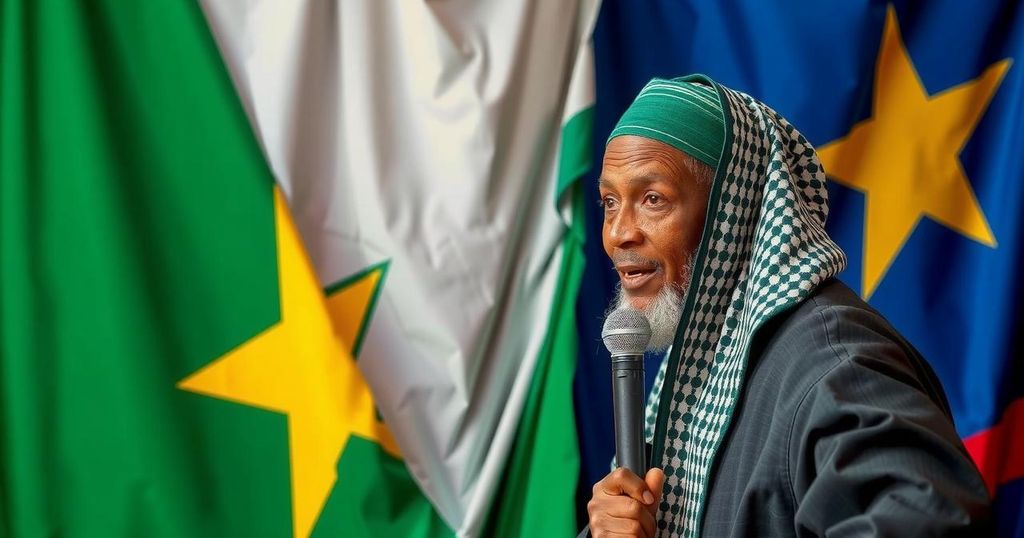El Burhan’s Visit to South Sudan: Addressing Critical Bilateral Issues
Lt. Gen. Abdel Fattah El Burhan visited South Sudan to discuss critical bilateral relations amidst escalating tensions and economic concerns. His discussions focused on issues such as oil transportation, border security, and the situation in Abyei. The visit coincides with a lack of effective governance in Sudan and internal political disputes in South Sudan, revealing the complex dynamics at play between the two nations.
Lt. Gen. Abdel Fattah El Burhan, the president of Sudan’s Sovereignty Council, visited Juba, the capital of South Sudan, to address significant issues affecting the bilateral relations between the two nations. This visit marks El Burhan’s third official trip since the commencement of hostilities between the Sudanese Armed Forces (SAF) and the Rapid Support Forces (RSF) in April of the previous year. Upon arrival at Juba International Airport, El Burhan was warmly received by South Sudan’s President Salva Kiir Mayardit and members of the Sudanese diplomatic contingent.
El Burhan was accompanied by several prominent officials, including the Minister of Energy and Oil, Mohyieddin Naeem, and the undersecretary of the Ministry of Foreign Affairs, Ambassador Hussein El Amin. According to journalist Ateem Simon, the visit was conducted without prior announcement, underscoring its urgency. Discussions between Sudan and South Sudan encompassed four key issues, particularly in light of the recent military escalations observed along their border.
Notably, the armed conflict between the SAF and RSF has intensified near the Sudan-South Sudan border, particularly in regions like Babnis and Heglig, which is rich in oil resources and contested by both nations. Furthermore, the critical issue of oil transportation looms large, as South Sudan relies heavily on Sudan to export its oil through a pipeline that has been non-operational since February due to technical difficulties. This cessation is inflicting substantial financial losses on both countries, with South Sudan reportedly losing $100 million each month from oil revenue. Previous discussions had taken place to resume these exports, but security concerns have hindered progress.
El Burhan’s visit also coincides with remarks made by Taban Deng Gai, one of South Sudan’s vice presidents, suggesting that Sudan lacks effective governance. This statement was clarified by the South Sudanese government, which indicated that it reflects Gai’s personal viewpoint rather than an official stance. Journalist Simon anticipates that El Burhan may express discontent regarding these assertions during his visit. Notably, El Burhan assumed power following a coup that ousted a civilian-led transitional government and is now viewed as a key supporter of the South Sudan Peace Agreement, despite its origins during former President Omar Al Bashir’s administration.
In this context, El Burhan’s presence in Juba is also linked to internal disputes within one of the political factions participating in the peace agreement, emphasizing the need for consensus among involved parties. The resolution of such disagreements in previous instances has often involved Sudan’s engagement, reinforcing the interconnected nature of governance in both South Sudan and Sudan.
The relations between Sudan and South Sudan have been historically complex, characterized by periods of conflict and cooperation. Following South Sudan’s secession from Sudan in 2011, the two nations have continued to navigate various political, economic, and security challenges. The ongoing conflict between the SAF and the RSF since 2021 presents additional complications, particularly affecting cross-border dynamics, trade, and cooperation on oil transport. South Sudan’s dependence on oil revenue makes these discussions critical for its economic stability, while Sudan struggles with its governance issues and the impact of regional security on its own economy. The South Sudan Peace Agreement has introduced a framework for cooperation, yet internal disagreements continue to impede progress.
In conclusion, Lt. Gen. Abdel Fattah El Burhan’s recent visit to South Sudan underscores the pressing need for dialogue between the two nations amidst escalating military tensions and economic challenges. The discussions aimed to address critical bilateral issues, particularly concerning oil transportation and security along the border. El Burhan’s role as a guarantor of the South Sudan Peace Agreement further emphasizes the intertwined fate of both countries, as they confront ongoing governance and humanitarian crises. As the situation evolves, continued cooperation and negotiation remain essential for the stability of both nations and the region.
Original Source: www.dabangasudan.org




Post Comment